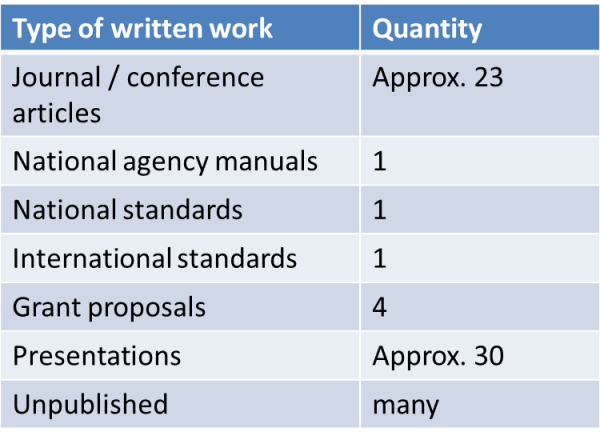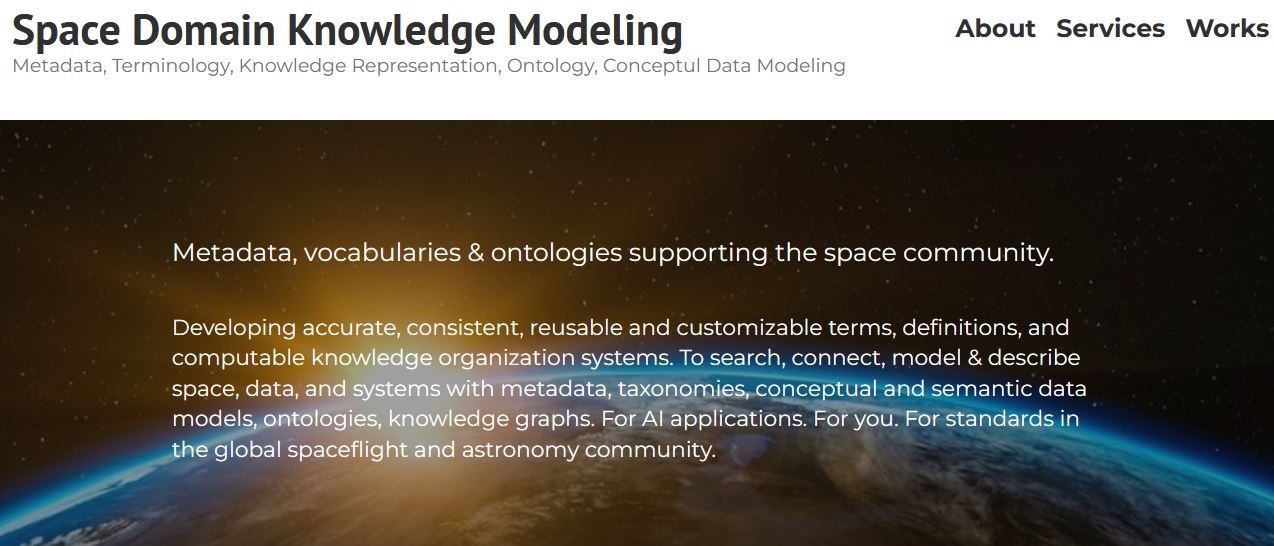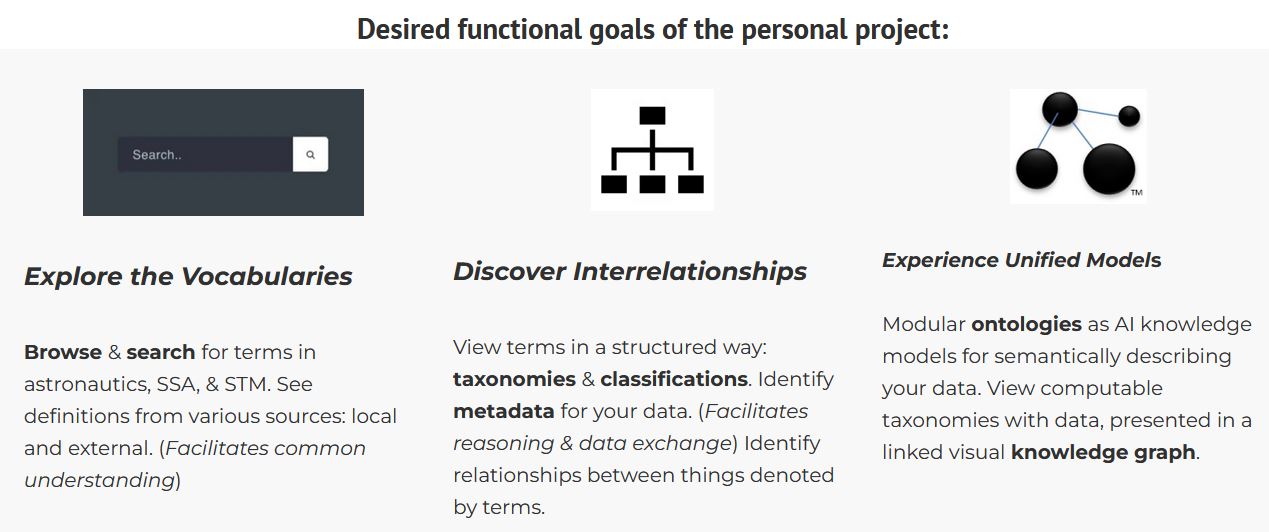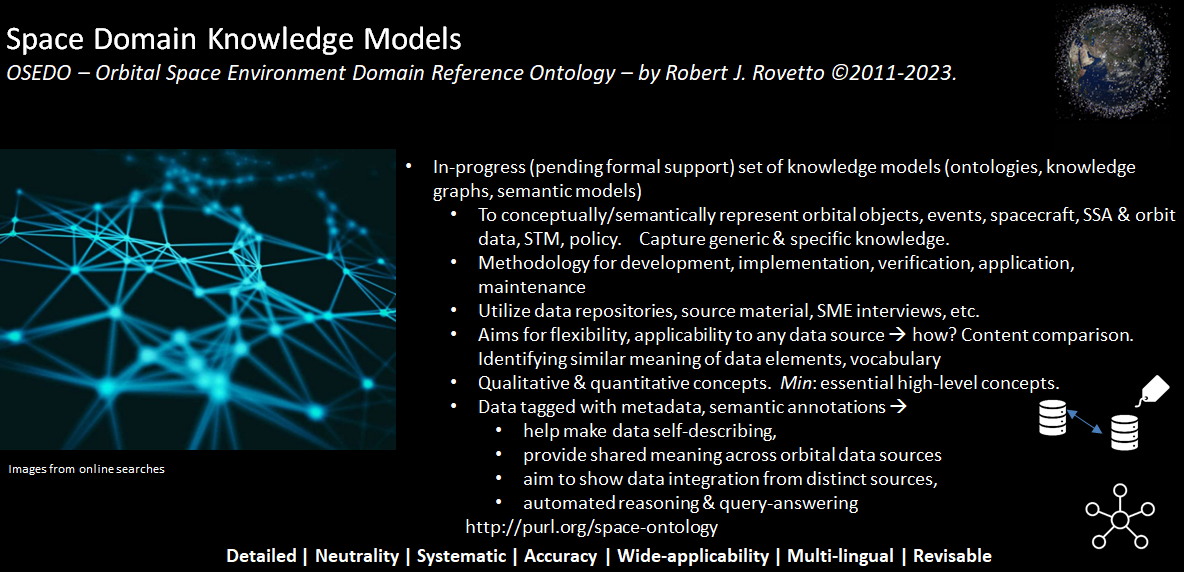Developing accurate, consistent, reusable, multi-lingual, scalable, customizable & computable knowledge organization systems, terms and definitions for the space community. To search, connect, model and describe space data & systems with metadata, taxonomies, conceptual and semantic data models, ontologies & knowledge graphs.
For AI applications. For you. For standards.
The Orbital Space Environment Domain Reference Ontology (OSEDO) by Robert J. Rovetto (email) is a living work to create AI knowledge organization & representation models — consisting of a suite of human and computer readable metadata, vocabularies, ontologies, and knowledge graphs — for spaceflight, astronomy and other space topics. Systematically being developed with an in-house methodology for various potential applications such as: data search, retrieval, integration, sharing; automated reasoning; decision support; knowledge discovery; MBSE; semantic annotation, artificial intelligence (AI) applications, etc., They will offer metadata, terminology, classifications, and semantic/conceptual models. They are potential standards via their consistent, accurate and reusable terms and definitions. To annotate, describe, label data and other content. To provide semantic layers on content. To provide cognitive & conceptual knowledge representations for AI or intelligent systems.
CALL TO ACTION
As a personal unfunded project to date, formal support is needed to continue and sustain development. Contact me if you'd like to donate, or become a sponsor or a patron; or to hire me, or establish a formal work partnership. Hire for selected services at this website.

Project Goals
- To support safe and sustainable spaceflight, space situational awareness (SSA), space traffic management (STM), astronomy, space science, space policy, and other space topics
- To support artificial intelligence (AI) and MBSE applications for spaceflight operations.
- To contribute to and improve aerospace terminology and standards at national and international
- Terminology normalization/harmonization/synchronization, & recommendations
- To provide additional formats for space data (in-progress conceptual data models)
- To determine the utility of knowledge-based techniques and technology.
- To complete a suite of reusable modular ontologies, conceptual domain models that capture astronautical knowledge, and describe the data, systems and the space domain.
- To provide comprehensible, widely-applicable and neutral vocabularies, metadata sets, classifications and ontologies that can annotate data and serve as standards for the global astronautical community.
- When sufficiently developed, to be used by a broad spectrum of users: industry, government, military, academia, specific projects, or other models.
- Ontology-annotated interactive dynamic 3D Visualizations of the orbital environment.
- To build ontologies and other knowledge organization systems for you: individuals, companies, agencies, & universities.
Potential Benefits
- Neutrality & Objectivity… through systematic analysis, and principled development.
- Diverse perspectives: conceptual, semantic, lexical, ontological analysis
- Reduces complexity in programming... by providing a reference model outside of the code (ontologies can be edited separately).
- Make data self-describing… as a semantic layer on databases.
- Semantic interoperability among disparate databases with similar content.
- Alignment among distinct vocabularies, and among disparate databases.
- Semantic search, data retrieval, and automated machine reasoning.
- Data sharing: facilitating data sharing & fusion for more comprehensible, complete and collaborative global SSA.
- Reduce ambiguity. Terminological normalization.
- Potentially resolve terminological & definitional questions in space policy & law
- innovation: exploring application to space visualizations, simulations, model-based systems engineering (MBSE), AI, and other technologies
Example Use: The SSAO by the author has been used by a solar system visualization project by NASA personnel
Example written works at this website link.

©2022-2023, Robert J. Rovetto. All rights reserved.



















